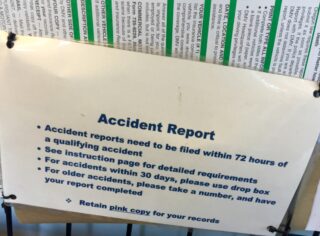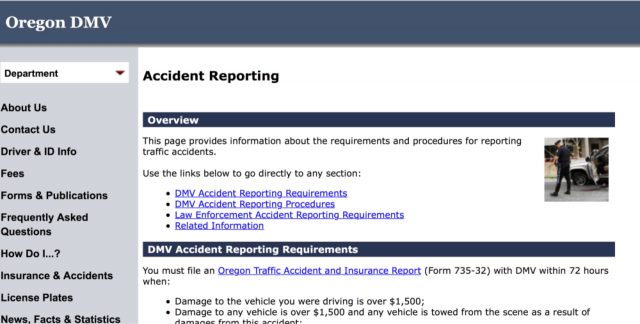
(Photo: J. Maus/BikePortland)
As advocates and even the Associated Press move away from calling all traffic incidents “accidents” there’s one important state agency that shows no signs of ridding itself of the controversial word. And unfortunately it just so happens to be the one agency that every single licensed driver has contact with: the Oregon Department of Motor Vehicles.
A few weeks ago I paid a visit to the DMV office in downtown Portland. As I walked in I noticed a wall rack full of forms and one of them stared back at me: “Accident Report” it read. It made my language and activism hairs stand on end. As many of you already know, there are a lot of reasons why the word “accident” should never be used in the context of vehicle interactions on streets. For starters, calling something an “accident” makes a huge assumption that the crash was unavoidable and unintentional. And if that isn’t reason enough, the term dismisses the pain of crash victims.
When I got home from the DMV I pulled up the DMV website and there was that word again, splashed all over the page. From local to regional to statewide government, I haven’t seen any transportation-related agency use the term “accident” so much. I had to ask the DMV about it.
So I emailed the DMV spokesman David House. Would you be willing to start a conversation to phase out the use of “accident” at the DMV? I asked. As usual House shared a thorough and thoughtful response.
House has been at the Oregon Department of Transportation (they manage the DMV) for nearly two decades and recalled that the discussion about whether to use “crash,” “collision,” or “accident” had been around since before he got there. He said the DMV uses both terms.
One of the big reasons is consistency and clarity. “Accident” is still used in many Oregon statutes and that’s why it’s also used on the DMV’s forms. Here are just a few of the laws the word comes up in:
801.026 (c) Failure to perform the duties of a driver involved in an accident or collision…
801.040 (5) Any incorporated city may by ordinance require that the driver of a vehicle involved in an accident…
801.280 … damages for liability, on account of accidents arising out of…
806.170 Department check on financial certification on accident reports
806.190 Insurance carrier report of person involved in accident
806.200 Failure to file after accident; penalty
House also said he believes “accident” is the most easily understood term because it has been so widely used for over a century.
Advertisement
What does he make of the push to reconsider the word?
“We have heard the argument that not all crashes are accidental – that some can even be considered intentional or inevitable based on intentional choices,” House said. “But even with all those bad choices, the crash itself was not intentional. There are cases in which an incident is intentional – but like the ‘homicide’ versus ‘murder’ example, people are innocent until proved guilty.”
“The only people debating the nuances between the terms are people who are passionate about language and writing.”
— David House, DMV public affairs
House said that the DMV uses “crash” and “accident” interchangeably. “‘Auto accident’ is widely understood everywhere else because in the context of automobiles and DMV, ‘accident’ means the same thing as ‘crash’ no matter intent, circumstance or fault,” he said.
Another reason the DMV is sticking with accident for now is that it’s simply not a priority for legislators. Even if it was potentially brought up, House added, “Lawmakers would ask themselves whether this change warranted the time and expense of changing statutes, forms, manuals and computer programming.”
And from his perspective, the public isn’t really clamoring for the change either. “The only people debating the nuances between the terms are people who are passionate about language and writing.”
In the end House’s goal at the DMV is to make sure the terms they use are easily understood so people can obey the laws and correctly fill out the forms after they’re involved in an incident. “If the nuances between the terms becomes a problem for people fulfilling their reporting requirements,” he said. “We’ll pursue a solution.”
One of the people who might want to see the DMV pursue a solution to this issue is Noel Mickelberry, executive director of Portland based nonprofit Oregon Walks.
“Language can help shift the way the public views a situation, and how they react to it, and in turn how policy, funding, and laws get changed as a result.”
— Noel Mickelberry, executive director of Oregon Walks
After I shared House’s comments with Mickelberry she said she was surprised that ODOT has been aware of the issue since the 1990s. “To me, that makes it even more surprising that a shift hasn’t taken place.”
Mickelberry also took notice of House’s assertion that the only people who care about this issue are those who are “passionate about language and writing.” “I think it’s been made clear through the ‘Crash not Accident’ campaign stemming from Families for Safe Streets in New York,” she said, “That the people that this really matters to are the people who have been impacted by traffic violence. When the media or an elected official or when, and even especially when, language by our government prioritizes a word that seems to trivialize the occurrence to an unavoidable one – it trivializes the reality that they are forced to live with for the rest of their life.”
In the broader picture Mickelberry believes the words we use impact our culture. Here’s what she says about that:
“Language can help shift the way the public views a situation, and how they react to it, and in turn how policy, funding, and laws get changed as a result. It should be important to all of us to ensure it is not triggering, trivializing, or demeaning – in any circumstance.
It is immensely hard to shift language, especially when you might not recognize the impact it has on other people. The word ‘lame’ has become a common used word to describe things that are stupid or boring. This word stems from describing people with physical limitations to movement. It is still not erased from our vocabulary, and it took me an embarrassingly long time to realize the roots of this word myself. As someone not directly impacted by the word, it was easy to ignore. We shouldn’t ignore this plea from families.”
— Jonathan Maus, (503) 706-8804 – jonathan@bikeportland.org
Our work is supported by subscribers. Please become one today.


